#cortisol is also known as the stress hormone
Explore tagged Tumblr posts
Text
penelope canonically retreating to her room and refusing food = she puts on some weight, the reason being both lack of physical activity as well as her body being on constant emergency mode (so what little she does eat ends up being stored away bc the body doesnt know when the 'starvation' will end). whats more her constant stress elevates cortisol levels which in and of itself leads to weight gain esp in the abdominal area.
tl;dr chubby penelope send fucking t w e e t
#that is it that is the post#cortisol is also known as the stress hormone#helps u wake up & regulates metabolism among other things#it helps you cope with stress but too much of it (much like anything else in life) is not good for you and your health#this has been on my mind for so long#no im not projecting#shush#thinking abt her naiad heritage too#like maybe she can get through long periods without or with very little food but her human body's nutritional needs prevail idk#and then midnight snacks maybe lol#away from the piercing gaze of the wretched suitors and judgemental looks of certain maidservants#chubby penelope for the soul#penelope of ithaca#my beloved muffin#with razor sharp teef#give the cinammon roll some tummy rolls!!#BONUS: when ody comes home they both heal together and side by side#coming to terms with just how merciless the years have been#ody gains healthy weight after years of abuse in ogygia (i hc he purposely denied himself proper food bc thats the only agency he had#as well as the making urself undesirable to the abuser)#and penelope goes for swims and perhaps bonds with telemachus in a new way like races and swimming competitions aw#as well as teaching him some naiad stuff he probably inherited#family healing yay!#:')#btw not saying they go back to their 20 year old physiques#what i am saying is they now take better care of themselves and each other#and one of the ways its reflected is in their frames#i think we need more middle aged odypen art#and age accurate content in general#esp post odyssey
25 notes
·
View notes
Text

☆⋆。 beauty boosting food! ☆⋆。
a healthy diet doesn’t have to be boring or repetitive! i see food (especially smoothies!!) as potions i can tailor towards exactly what i need. this post is to tell you about what i like to call functional foods ✧˖°
୨୧ skin treats ୨୧
feed your skin from within !! ໒꒱ ‧₊˚
🍓 berries — packed with antioxidants to keep your skin looking bright. my favs are blueberries, strawberries, and goji berries !!
🥑 avocado — full of healthy fats, helps keep your skin hydrated and soft, reducing the appearance of wrinkles. it can also be used topically! i love it on toast or as a base for smoothies!
🥕 carrots — rich in beta-carotene (a type of vitamin A), carrots can help improve skin tone and even give you a subtle glow. some people even take concentrated capsules to look tanner 0.o
🌿 green tea — high in antioxidants, especially EGCG, green tea can help fight inflammation and reduce acne. it has caffeine so it’s a great morning drink!! ヽ(✿���▽゚)ノ
୨୧ hair helpers ୨୧
for visibly and structurally healthy hair! ミ☆
🥥 coconut oil — you can add this to smoothies or use it for cooking, and the healthy fats will nourish your hair from the inside out. you can even use it as a hair mask !
🌰 nuts & seeds — they’re full of omega-3 fatty acids and vitamin E, nuts and seeds like almonds, walnuts, chia, and flaxseeds promote hair growth and prevent damage !
🐟 salmon — packed with omega-3s and protein, salmon can make your hair stronger and shinier. it's a beauty superfood! i feed it to my cat to keep her extra shiny ᓚ₍^・ﻌ・^₎
🍳 eggs — eggs are full of biotin and protein, both of which are essential for strong, healthy hair !!
୨୧ brain boosters ୨୧
for focus, memory, and mental clarity, keep your brain beautiful! જ⁀➴
🥑 avocado — besides being a skin and hair hero, avocado also supports brain health with its rich supply of healthy fats and vitamin K. we love a multi-functional food !
🍫 dark chocolate — full of flavonoids, caffeine, and antioxidants, dark chocolate can improve brain function and give you a quick mood lift ⭑.ᐟ
🫐 blueberries — these little berries are packed with antioxidants that protect your brain from aging and boost memory. they’re also antioxidants which i mentioned above ^.^
🐠 fatty fish — fish like salmon, sardines, and mackerel are high in omega-3s, which are key for brain health !
୨୧ healthy body support ୨୧
keep your body strong and healthy to support ur princess lifee ૮ ∩´ᵕ`∩ ྀིა
🍠 sweet potatoes — packed with fiber, vitamins, and minerals, sweet potatoes help with digestion, boost immunity, and keep you full of energy.
🥦 broccoli — this veggie is a powerhouse of vitamins C, K, and folate. it's great for immune support, bone health, and even glowing skin.
🍋 lemon — starting ur day with lemon water can help to aid digestion, boost vitamin C levels, and keep your immune system strong. it's a simple way to give your body some love and is super yummy !
🍄 mushrooms — rich in selenium and antioxidants, mushrooms are amazing for your immune system! just make sure you do your research >.
୨୧ hormone balancers ୨୧
help balance your hormones ≽^-˕-^≼
🌱 flaxseeds — full of lignans, which can help balance estrogen levels, flaxseeds are great for hormone health, especially during the premenstrual period !
🍳 egg yolks — a great source of vitamin D and choline, egg yolks help regulate hormones and keep you feeling balanced !
🥛 almond milk — almonds are a good source of magnesium, which helps control stress hormones like cortisol. plus, it’s a dairy-free option that's easy on digestion !
🍠 maca root — this is a superfood known for balancing hormones, boosting energy, and improving fertility. you can find it in powder form to add to your smoothies or oatmeal.
୨୧ overall self-love ୨୧
you deserve the best! ₊˚⊹ ʚɞ
🍋 lemon — full of vitamin C, which helps with collagen production, lemons can brighten your skin and boost your immune system. i like to start my day with warm lemon water !
🍃 leafy greens — spinach, kale, and other leafy greens are full of vitamins and minerals that detox your body and keep your skin clear ! they’re a great thing to add to smoothies for an extra vitamin boost !
🍍 pineapple — this tropical fruit has enzymes that can aid digestion and give your skin that lit-from-within glow :3
🍯 honey — nature's sweet healer! honey has antibacterial properties, so it’s great for your immune system and can even be used topically for glowing skin. thanks bees !! 🐝˚ ༘ ೀ⋆。˚
#it girl#self concept#self care#that girl#self love#it girl energy#dream girl#dream life#dreamy#hyper femininity#hyper feminine#girly#girl blog#princess#dolly#aesthetic#health & fitness
50 notes
·
View notes
Text



Hormones & Weight loss (part 1) : Cortisol



Cortisol
Cortisol, also known as the stress hormone, is a circadian hormone, meaning it follows a 24-hour cycle. Its levels naturally increase in the morning with sunlight and decrease in the evening to support sleep. It works in tandem with melatonin to regulate your sleep-wake cycle. However, chronic stress and inflammation can lead to consistently elevated cortisol levels, making weight loss difficult and promoting abdominal/visceral fat storage.
🩵 What It Does: Chronic stress increases fat storage, especially around the abdomen, and heightens cravings for sugary or fatty foods.
🩵 Signs & Symptoms: Fatigue, weight gain around the abdomen, sugar cravings, sleep disturbances, anxiety, and feeling “wired but tired.”
🩵 How to Support:
• Sunlight before screen light: Upon waking, spend 5–20 minutes in natural daylight. This could include a morning walk, journaling outdoors, or simply sitting on your balcony or outdoor stairs.
• Sleep hygiene: Optimize your sleep by keeping a consistent bedtime, lowering the temperature in your bedroom before sleeping, and avoiding naps during the day.
• Stress management: Engage in activities that align with your belief system, such as prayer, guided meditation, or breathing exercises. Spend time on meaningful or creative activities, connect with loved ones (including pets), and take walks in nature.
🩵 Supplements that may help:
• Magnesium: Supports relaxation and can help regulate cortisol.
• Ashwagandha: An adaptogen with evidence suggesting it lowers cortisol levels in stressed individuals.
• L-theanine: Promotes relaxation without drowsiness, helping to balance cortisol by reducing stress.
• Phosphatidylserine: Studies indicate it may reduce cortisol spikes, especially after intense physical activity.
🩵 Always talk to your doctor if you have any concerns about unbalanced cortisol, before making any significant diet/lifestyle changes and before taking any supplements.
#2025#fitblr#fitness#health and wellness#losing weight#weight loss#wellbeing#wellnessjourney#healthy#health & fitness#stress#stress management#cortisol#hormonalbalance#hormones#hormonalhealth#glow up#that girl#it girl
27 notes
·
View notes
Text
Yashiro hypersexuality and trauma response.
(Part 2)
(If you did not read part 1 go read it first otherwise you will feel a little lost lol)
Let's get into the heart of the subject;
Yashiro's hypersexuality:
Hypersexuality, also known as compulsive sexual behavior or sexual addiction, is a state where an individual experiences an intense preoccupation with sexual thoughts, feelings, or behaviors that may feel out of their control. It involves an excessive and uncontrollable urge for sexual gratification, often leading to detrimental consequences in various areas of life, including relationships, work, and overall well-being.
Hypersexuality after assault, commonly referred to as hypersexual trauma, represents a complex psychological response to the experience of sexual assault or trauma. Individuals who have endured sexual violence or other types of trauma may exhibit compulsive and excessive sexual behaviors as a means of coping with emotional distress.
Trauma, especially in the context of sexual abuse, can significantly impact one’s sexual desire and behavior. The biological mechanism behind this is linked to the body’s stress response. During a traumatic experience, the body releases stress hormones like cortisol and adrenaline, which can affect the normal functioning of the brain’s pleasure and reward system. This alteration can lead to an increased drive to seek pleasure, including sexual gratification, as a way to cope with the emotional distress caused by the trauma
Engaging in hypersexual behavior can serve as a way to temporarily numb emotional pain and distress, allowing individuals to escape from the overwhelming feelings associated with the traumatic experience.
Certain demographics are more prone to experiencing hypersexuality as a result of trauma. These groups include:
Survivors of childhood sexual abuse often struggle with unresolved trauma and the associated emotional distress that can manifest as hypersexual behavior.
Individuals with a history of complex trauma, such as repeated or prolonged exposure to traumatic events can lead to heightened vulnerability to developing maladaptive coping mechanisms, including hypersexuality.
Those with a history of insecure attachment styles, as the lack of secure emotional bonds can contribute to difficulties in forming healthy relationships, making some individuals more susceptible to seeking emotional fulfillment through hypersexual behavior as a substitute for genuine intimacy.
Again Y check all the boxes.
Yashiro is using violent sex as a form of self harm:
Violent sex for Y is a form of self harm, coping mechanism and self deffense mechanism.
He is seeking unsafe sexual practice to calm himself down to numb he's feeling so the pain he feel physically cover's the one he feels inside.
Here a perfect example:

"Anyone will do. Just fill me up.."
Y is in distress to see he's first love with an another man (that he put together btw..something that he would be incapable to do with doumeki ) so he seek sex as a relief, to forget, again, the psychological pain.
he is harming himself cause he's resilied that this is the only thing he deserve, him, that don't deserve any love or care.

Y never really lived this room, the scars could never heal cause they were constantly reopened
Constantly, to a point were he was obligated to convince himself that it was nobody's fault, this is how Y finish by thinking and accepting that he enjoy the pain.
If he enjoy the pain he would not get pregnant, his mom would not be mad and if he accept all of this than what's happening to him is not that bad anymore, if he make it part of his identity than it's not a trauma anymore it's not that big of a deal and that how he survived.
That how he finish by building his masochist lusfull cat persona: I love sex and pain and I don't give a fuck about myself so no one can hurt me I'm not vulnerable anymore, if It's me that is seeking it now .
He convinced himself that if it's not painfull he can feel anything but we know it's not true and that just the way he built his facade, his mask he been wearing all those years to survive, Y is a really great actor and all his life he hided his true feeling away, he was so good at hiding it that he even convinced himself (not even mentioning that he may be suffering from post traumatic memory loss).
Yashiro never had a safe place, so he built a "safe place" in the unsafe,
he just tried his best to stay on the surface, just enough to not drown completly.
In the end he is still this powerless child that being abused by the world.
Thank you for reading till the end .See you soon!
31 notes
·
View notes
Text
Apigenin is a powerful natural flavonoid known for its hormone balancing, relaxing & overall health benefits! It also has anti inflammatory & antioxidant properties
🔬 What does it do?
Lowers cortisol (can reduce stress by up to 47%)
Supports deep sleep
Acts as an aromatase inhibitor (helps regulate estrogen)
Reduces inflammation & oxidative stress
Protects brain health & supporting memory
🌿 Found in:
Chamomile— best natural source!
Parsley 🌱
Celery 🥬
Oregano 🌿
Thyme 🍃
Oranges 🍊
Grapefruit 🧡
#beauty and wellness#health & fitness#health and wellness#health is wealth#healthy eating#healthy food#healthylifestyle#healthyliving#wellness girl#wellness routine#health and beauty#wellnesstips#wellness goals#wellnessjourney
6 notes
·
View notes
Text
It would have been fine...

Chapter 1
Travis hasn’t gotten consistent physical contact since he left the Horizon for the first time. He hasn’t had much reason to think much about it, either. And then some plant goes and attacks him, and he’s starting to see why it might be a problem.

If the shit was going to hit the fan, Travis sometimes wished it would hesitate a little less.
The away mission had gone fine. He had been assigned to pilot T’Pol and three Sciences crewmen down to a new, tropical M-Class planet—Philotes Major, he thought he'd heard—and accompany them as they took plant samples.
The planet was strangely beautiful. Lush, warm, humid forests of violet trees that were covered in vines. A pinkish, cloudy sky. Odd, sweet-smelling flowers everywhere that reminded Travis of hibiscuses.
It had been his fault, really. T’Pol had told him not to get too close to the foliage. “We don’t know what could be down here,” she’d said matter-of-factly. “While there were no new elements on the initial planetary scan, we should still act with the utmost caution.”
And then…
Pff!
Travis hadn’t quite seen the flower before it had sprayed him, straight in the face. It had taken him a second to register what had just happened. Just enough time for T’Pol, who'd gotten a smaller dose of pollen, to shepherd everyone back to the shuttlepod, a sample of the flower—a blue catchfly-looking thing—in tow. The pollen was sweet-smelling but transparent; to anyone else, it didn't seem like anything had happened.
They’d gotten back to the ship and gotten through Decon, slightly shaken but unharmed. He and T'Pol had been sent to sickbay immediately, and everything checked out.
They were fine.
And then he woke up the next morning, and he was definitely not fine.
He wasn’t in pain. As it turned out, he didn’t need to be. He was absolutely miserable.
This was almost worse than pain—like a middle ground between a tickle and an itch, but affecting every square inch of his skin. Every once in a while, it would make Travis shiver, shooting goosebumps along his arms or down his neck. The longer he sat with the sensation, the more it felt like the very end of a feather, barely touching his skin. It was light, and tingly, and persistent, and fucking everywhere.
The only thing that seemed to help was having the shower as hot as possible. As the feeling started to dissipate, he started to notice a certain … anxiety starting to go away, as well. About what, exactly, Travis couldn’t say. It was less about any issue in particular and more a general kind of unease, sitting low in his chest.
As he finally stepped out of the shower, Travis resolved to check back in with Phlox. This had to be some sort of allergy or poison. Right?
---
“The good news, Mr. Mayweather, is that you have not been poisoned,” Phlox announced. “You’re also not having an allergic reaction—at least, not per se. That leads me to the bad news: the pollen that you encountered yesterday contained a chemical compound known as a cortihistamine.”
Travis blinked, staring at him. “A what?”
“A cortihistamine,” Phlox repeated. “As the name suggests, it signals the brain to produce elevated levels of cortisol—the hormone responsible for stress—and histamines—the chemicals responsible for allergic reactions. Hence, the issue of your skin … crawling, as you say. Such an interesting phrase. In any case, despite the name, antihistamines have no effect. It would seem that the chemical is named for its effects, rather than its composition.”
Travis blinked again, his mind attempting to put together some incoherent thought about psychological warfare and death by allergies. “Well,” he started, “that’s unfortunate, but … why would a plant even produce something like that?”
“In the case of the particular flower you encountered—Nocturna paludosa macrantha, otherwise known as crushbloom—the function of it is really quite fascinating. The flower douses an animal—usually small prey—with its pollen. Then, after a while, that animal’s skin will start crawling and itching, and it will likely become irritable and anxious, much as you are now.”
Travis started to open his mouth to protest, but Phlox cut him off.
“Now, the animal may or may not learn, through burrowing practices and certain … social behaviors, that the solution is deep pressure. After several weeks, assuming it doesn’t get enough of this kind of pressure, the animal will have been … essentially, run so ragged by the itch and elevated cortisol that it will—quite literally—run into a predator’s mouth.”
Travis blanched. A plant that made animals on Philotes Major miserable enough to let themselves get eaten.
"Right."
“Because of certain anti-acidic properties, the pollen is not digested, which then allows it to re-propagate through the predator’s resulting excrement.”
His brain didn’t give him much time to think too hard about that. His brow furrowed. “So wait, back up. What exactly is deep pressure?”
“Deep pressure is … essentially, as the name suggests. In technical terms, it's firm tactile sensory input that provides proprioceptive input to the body. Ultimately, the more of it you can get, and the more consistently you can get it, the sooner these symptoms should subside.”
Travis gave Phlox a suspicious look. “What kind of … sensory input are we talking about, Doctor?”
“Well…” he thought for a moment, then put his PADD down. “If you’d allow me to demonstrate?”
“Uh … yeah, sure.”
Phlox stepped forward and firmly placed his hands on Travis’ broad shoulders, squeezing gently. “Things like this,” he explained. “In general, being firmly held or squeezed can have similar effects. Hugs, massages, cuddling … that type of thing.”
The words didn’t register at first. The second Travis felt the contact, he gasped a little. On his next exhale, he had to bite back a moan of relief.
The skin on his shoulders had stopped crawling, sure. But, with the touch of Phlox's hands instead of the hot water of the shower, it was more than that now. A sort of warmth took its place — something that felt like comfort. Travis immediately felt his mind fly back a decade. This was what it felt like when Paul would roughhouse with him. Or when his mom would give him a hug. Or when his father would put a hand on his bicep as he explained something about how the Horizon worked. Travis did the math: he hadn’t gotten anything like that—not regularly, anyway—since he was sixteen. Sure, Hoshi and Trip would give him side hugs every so often, and Captain Archer would sometimes clap him on the shoulder, but nothing consistent.
A lump formed in his throat as he realized, with some horror, how much he’d missed it.
He’d thought it didn’t matter. What kind of man—what kind of grown man—needed hugs to function? Travis swallowed thickly. How was he supposed to get them now without looking like a child? Travis was supposed to protect and care for his friends. And sure, as siblings in arms, they ought to protect him back. But at the end of the day, he had to take care of himself. He couldn’t entirely count on anyone else. It was a great way to get hurt for no reason.
Something blipped on Travis’ monitor. Phlox walked away to look up at it, and Travis suddenly found himself embarrassingly upset, as if something precious had just been torn away from him. His head lurched forward, his vision going blurry.
Seeing the source of the blip, Phlox smiled. “It would appear that the contact involved will provide a hearty dose of endorphins, as well. No wonder the pollen is so potent.” He started to turn back toward Travis. “This process should be relatively—Mr. Mayweather?”
Travis drew in a ragged breath, before looking up at Phlox. “I don’t know if those … endorphins … last after the contact.”
The doctor’s face fell a little. “Ah…”
Travis felt the pit in his stomach start to come back, along with his skin starting to crawl. “What do I need to do, exactly?” he asked.
“Well … you have friends on this ship, don’t you?”
“I do…”
“You ought to enlist them, then,” Phlox said, quirking an eyebrow. “My understanding is that humans friendly with each other tend to initiate close contact. Isn’t that correct?”
“Well, yes, but—”
“Excellent!” Phlox exclaimed, smiling again. “You should be able to get plenty of close contact that way. Perhaps from Mr. Tucker or Ms. Sato, hm?” Something in his eyes told Travis that he knew more than he was letting on.
Travis swallowed thickly again. He was screwed. There was no way anyone on the ship would touch him that frequently, even Hoshi or Trip. Even they only gave side hugs. That was it … right?
Travis sighed. Whether he was right or wrong, this was about to get very, very embarrassing.

End-of-chapter note: To my knowledge, cortihistamines do not actually exist, nor does Nocturna paludosa macrantha. I needed a vaguely science-y name for cuddle pollen that wasn’t “cuddle pollen” and my sources were two Google searches and two blogs about plant names. If I screwed something up, don’t worry about it.
Chapters:
1 (you are here) 2 || 3 || 4 || 5 ||
7 notes
·
View notes
Text
Health: Adrenal Glands
TCM: Jing, Kidneys
GNM: Off Track (cortex), Unbearable Stress (medulla)
Greek: Sanguine (cortex), Choleric (medulla)
Chakra: Root
Astrology: Mars, Aries-Libra; ex. managing adrenal health can be especially important for natal placements like Mars in Libra/7th, Mars in Pisces/12th, South Node conjunct Mars, etc.

The adrenal glands, which sit atop the kidneys, play a central role in the body's response to stress, fatigue, immune challenges, and several key physiological and metabolic functions. Issues related to the adrenal glands is very common yet highly under-diagnosed. They consist of two regions:
Adrenal Cortex: Derived from the mesodermal base substance cholesterol, the adrenal cortex produces hormones such as cortisol, corticosterone, aldosterone, and male sex hormones. These hormones play vital roles in physiological functions. Cortisol and corticosterone, known as stress hormones, contribute to the regulation of metabolism, inflammation, and blood sugar, and assist in long-term stress response by enriching the blood with minerals and glucose. Their anabolic effects also aid in healing and regeneration. Aldosterone helps maintain blood pressure by regulating the balance of salt and water in the body. The adrenal cortex's production of male sex hormones can influence the reproductive system. If unresolved, chronic stress may lead to excessive cortisol production, causing problems like weight gain and high blood sugar.
Adrenal Medulla: The endodermal adrenal medulla manages emotional and physical stress by producing the hormones noradrenaline, dopamine, and adrenaline. These hormones are pivotal in activating the "fight, fright, flight" response, a physiological reaction that occurs in response to a perceived harmful event or threat. This acute stress response increases heart rate, blood sugar, and mental alertness, along with other physiological changes. Chronic anger or emotional upheaval can strain the adrenal medulla, leading to an energetic drain.
Stress
The adrenal glands are highly sensitive to stress, and chronic stress can lead to various disorders:
Psychiatric Disorders: Neuroses, post-traumatic stress disorder (PTSD), depression, anxiety disorders, bipolar disorder.
Neurological Disorders: Migraines, peripheral neuropathy, dizziness, tremors.
Glandular Disorders: Issues related to other glands including the thyroid which is responsible for cell growth; for instance, uterine cancer, polyps, hypothyroidism, hyperthyroidism.
Cardiovascular Disorders: Coronary artery disease, stroke, heart attack, hypertension, arrhythmias.
Respiratory Disorders: Asthma, chronic obstructive pulmonary disease (COPD), difficulty in breathing.
Immunological Disorders: Possible tumor promotion, reduced resistance to infection, autoimmune disorders, chronic inflammation.
Metabolic Disorders: Diabetes, obesity, metabolic syndrome, difficulty in regulating blood sugar.
Gastrointestinal Disorders: Ulcers, irritable bowel syndrome (IBS), chronic indigestion, malabsorption.
Genitourinary Disorders: Impotence, incontinence, menstrual problems, urinary tract infections, kidney dysfunction.
Musculoskeletal Disorders: Muscle weakness, chronic fatigue, fibromyalgia, joint pain.
Skin Disorders: Acne, eczema, psoriasis, skin thinning.
Cysts and Cancer
Adrenal Weakness: If the adrenal glands don't produce enough adrenaline, the heart may pump slower, leading to fluid accumulation and cysts in the prostate, ovaries, and breasts. These cysts can harden and potentially lead to cancer.
Blood Flow: Increasing blood flow can help resolve cysts if addressed quickly.
Signs of Imbalance
Frequent sickness, fatigue, low libido, low backache, chronic health issues, dark circles under the eyes, hair loss, early greying, frequent urination at night, cold hands and feet, brain fog, pain and weakness in the lower back, loins, thighs, knees and lower body, urinary weakness and debility, polyuria and nocturia, impotence and male sexual dysfunction, moodiness and irritability, depression, muscle or bone loss, autoimmune conditions, chronic fatigue, hormone imbalance, body aches, unexplained weight loss, lightheadedness, skin discoloration (hyperpigmentation), weakened stress response, insulin resistance, sleep problems, weight gain, sweet and salty food cravings, difficulty getting up in the morning, increased PMS or menopausal symptoms, inability to handle stress, increased allergies, frequent sighing, cravings for salty foods, higher energy levels in the evenings, overuse of stimulants like caffeine.
Traditional Chinese Medicine (TCM)
Jing (essence): The statement by the Chinese that the kidneys harbor our Jing refers to the adrenals having the highest concentration of neural crest cell derivatives in the entire body. Strong Jing corresponds to robust characteristics like strong teeth, which are made by neural crest cells, while weak Jing relates to signs of aging like grey hair and deafness, also linked to neural crest cells. Jing's manifestations include the progression from youth to adulthood, reflected in functions controlled by the pituitary (aided by neural crest cells), and can be seen in the structure of the face and jaw. Neural crest cells also create the heart's connective tissue, affecting lifespan. Jing as a concept is not the same as neural crest cells but they represent the body's inherent organizational strength. Weak organizational energy leads to neural crest cells that don't form properly or function well, resulting in genetic disorders affecting facial development. The Chinese recognized these markers as indicators of weak Jing.
Kidneys & Urinary Tract: The adrenal glands are connected to the kidneys not just through the renal fascia, but also by way of the renal artery, draining into the renal vein, and receiving nerve connections from the renal plexus. The kidneys regulates the body's water content and are essential for maintaining healthy bones, as well as producing healthy bone marrow and blood. It determines the level of adrenaline and dopamine in the body, affecting our energy and rest. In addition, it forms a relationship with the heart through various hormones. During puberty, the adrenal cortex starts to produce sex hormones like testosterone and oestrogen, and this production continues throughout adulthood. Caffeine depletes kidney qi, yang, yin, and essence, contributing to liver and adrenal issues, and long-term exhaustion. Regular coffee drinkers, especially those who don’t feel its effects, may be nearing adrenal exhaustion. Adrenal fatigue is often considered a kidney yang deficiency. If left untreated, it can progress to a kidney yin deficiency. These deficiencies are often marked by a light low groaning tone to the voice, a darkish pallor under the eyes, negative attitudes of insufficiency or inadequacy, needing to sit and not being able to stand for long, and worrying about money. Additionally, those who experience traumatic shock or long term stress often have their hair turn gray or fall out.
Kidney Yang (medulla): Linked to the reactive sympathetic nervous system and the hormones adrenaline, dopamine, and norepinephrine, produced in the adrenals. A deficiency in kidney yang can lead to symptoms like cold hands and feet, edema, night urination, and low libido. This deficiency parallels disorders like adrenal fatigue, hypothyroidism, and sexual dysfunction. This condition is worsened by the use of marijuana, diminishing our natural drive, motivation, and willpower. Adrenaline is used to treat conditions like asthma, anaphylaxis, and slow heart rates. It works on the cell membrane's outside, which is known as the yang aspect of the cell. It never enters the cell but attaches to a receptor on the outside, initiating a cascade of chemicals that open or close gates on the cell's exterior. In the heart and muscles, adrenaline prompts more calcium to enter, which amplifies the force of contraction; in the lungs, it leads to the relaxation of the muscles, permitting more air to flow in; in the brain, it initiates the emotional reactions connected with fear.
Kidney Yin (cortex): Associated with the parasympathetic nervous system and the hormone cortisol, produced in the adrenals. A kidney yin deficiency may manifest as sore back, leg weakness, insomnia, and anxiety. It may parallel disorders like diabetes, high blood pressure, and hyperthyroidism. Although necessary for daily function and stress response, excessive cortisol can lead to fluid retention, osteoporosis, muscle wasting, depression, and diabetes. If our bodies stopped producing cortisol, it would result in significant illness. While adrenaline binds to the exterior of the cell (yang), cortisol is absorbed into the very core (yin). Contrary to the effects of adrenaline which are more immediate, the effects of cortisol can take years.
Greek Medicine
Hot Temperament: The adrenals are generally represented as stimulating and energizing various functions to adapt to stress.
Adrenal Cortex: Sanguine, nutritive, and anabolic, enriching the blood and decreasing swelling.
Adrenal Medulla: Choleric, energetic, and catabolic, stimulating acute stress response.
Faculty Support: Adrenal glands produce supplementary amounts of sexual hormones, bridging a connection between vital and generative faculties; supporting heart and lungs (vital), kidneys and pancreas in blood sugar regulation (natural), enhancing mental alertness and stimulating the sympathetic nervous system functioning (psychic), supporting male sexual function and response (generative).
Root Center: The adrenals form the basic energetic support for the entire organism, associated with the Root Chakra.
Kidneys & Urinary Tract: Weak adrenals may adversely affect the vitality and functioning of the kidneys and urinary tract, which are interlinked with the adrenal glands'. When the kidneys are not effectively eliminating fluids, it can lead to the accumulation of phlegm and moisture. Additionally, the kidneys have a connection to the soles of the feet which may be affected by cold conditions. Conditions of melancholy or devitalization of the adrenals, kidneys, and urinary tract often correlate with chronic fatigue.
Adrenal Exhaustion: Chronic stress and irregular habits can lead to fatigue, irritability, pain, and impotence in men usually caused by flare-ups of Choleric anger or any experiences which feel like a roller coaster. Sexual overindulgence also exhaust the adrenals.
Male Sexual Function: The adrenal glands provide energetic support for male sexual function. Issues with adrenal energy may result in sexual dysfunction, including impotence or premature ejaculation.
Blood Sugar Regulation: In instances of dangerously low blood sugar, the adrenal glands jump into action, raising levels through adrenaline. Chronic instability may involve adrenocortical hormones, aggravating factors in type II diabetes.
German New Medicine (GNM)
Adrenal Cortex (Off Track)
Conflict: Feeling like you've made a wrong choice or gone down the wrong path.
Under-Functioning: Waterhouse-Friedrichsen syndrome, adrenal gland insufficiency, Addison's disease. Reduced cortisol production, feeling stressed and tired.
Over-Functioning: Excess cortisol (Cushing's disease) with high blood pressure, round face, obesity, muscle atrophy or aldosterone (Conn's syndrome) with high blood pressure, low potassium, weak muscles, thirst, frequent urination.
Adrenal Medulla (Unbearable Stress)
Conflict: Extreme tension from stress, feeling overwhelmed. Something is beyond reach.
Diagnosis: Pheochromocytoma, neuroblastoma. High blood pressure, racing heart, increased blood sugar, sweating.
Astrology
Mars: This planet governs adrenaline, testosterone, male sexual function, playing a role in the catabolic metabolism where fuel is burned. It also oversees the release of toxins, the regulation of red blood cells, iron, and muscle tissue, including tendons and ligaments. It extends to the entire muscular system, embodying vitality and physical strength. The energy of Mars is hot and dry so it's temperament is Choleric. Mars co-rules the adrenals (with Aries/Libra) and the male genitalia (Scorpio).
Aries: Aries is a Choleric sign, and its will to action makes it prone to anger and stress, which deplete and weaken the adrenal glands. The sign is energetic, sharp-eyed, cheerful, and alert, but may become irritable and have a restless tendency to keep going until burnout. This can lead to eyestrain and poor vision as the health of the eyes is dependent on the strength of the adrenals. The preference for stimulants like chili pepper, caffeine, and their attraction to the Sun can overstimulate the adrenal glands, leading them to seek cooling substances like icy drinks, fruits, and seafood.
Libra: Libra, the Sanguine Air sign that rules the kidneys and lower back, is a counterbalance to Aries. The kidneys and genitourinary tract are only as strong and healthy as the adrenal glands, which are their energetic support. Underlying adrenal weakness and exhaustion weakens the kidneys and genitourinary system, leading to urinary debility, urinary tract infections, inflammation or irritation, uremia, and gout. Since male sexual function is also dependent on the strength and health of the adrenal glands, problems may arise in this area.
Aries-Libra Dynamic: Kidneys, adrenals, eyes, head and cranium, low back, lumbar spine, bladder, genitourinary system (especially male), hips and loins. Aries represents personal power, autonomy, honesty, and decisiveness, often leaning towards individualism and assertiveness. Libra, on the other hand, emphasizes cooperation, diplomacy, compromise, and social harmony. While Aries is direct and often acts alone, Libra seeks mutual choice and operates through consensus. This represents a struggle between competition and cooperation, selfhood and partnership, war and peace, doing and being. Finding balance is needed for acid/alkaline balance, as Aries tends to run acidic, and for hormonal balance, where Aries tends toward excess testosterone. The tension between these two forces may cause a lot of frustration and aggravation, particularly in males, manifesting as irritation or inflammation of the genitourinary tract.
Healing and Relief
Diet: Paleo; reduce caffeine, sugars and sweeteners, gluten, starch, white flour, processed foods, and hydrogenated oils.
Nutritional Supplements: Ionic Magnesium, B Vitamins, Omega-3 Fatty Acids, Vitamin C, Zinc, Probiotics, L-Theanine
Herbal Adaptogens: Ashwagandha, Rhodiola Rosea, Holy Basil, Licorice Root, Siberian Ginseng, He Shou Wu
Lifestyle Considerations: Address societal pressure to perform, lack of self-care, and the conflict in real life. Regular exercise of varied intensity. Practice meditation, mindfulness, Tai Chi, Qigong. Express creatively and spend time in nature. Align sleep schedule with circadian rhythm to nourish yin. Hydrate more and add salt to water. Avoid various toxins like dioxin or insecticides which contribute to adrenal malfunction. Spend more time in the sun each day. Don't sit for too long. Try wearing a haramaki, stretch cotton (for summer) or stretch wool (for winter).
These are research notes from the work of Daniel Keown, Michel Odoul, Michael Tierra, Lesley Tierra, Johan Boshwinkel, David Osborn, Judith Hill, Eileen Nauman, Björn Eybl, Caroline Markolin, Deb Shapiro, and Jody Smith.
#adrenaline#kidneys#urinary tract#adrenal glands#adrenal fatigue#somatic#medicine#mind body connection#naturopathy#astrology#holistic#chakras#gnm#tcm#chinese medicine#healing#aries#libra#psychosomatic#health
47 notes
·
View notes
Note
hi sex witch, do you know if vaginal discharge can be affected by (non-sti) illness? asking bc i currently have covid and have been noticing that i’m uhh wetter, like, for no reason, and i’m curious if that’s related to being sick or if my pussy is just on some different shit

hi anon,
while covid itself isn't known to have any effect on vaginal discharge, experiencing stress can. cortisol, a hormone affiliated with stress, can impact the natural self-cleaning cycle of the vagina and send it into overdrive, creating more of the discharge you're experiencing. lots of things can cause stress, but fighting off an illness is definitely one of them!
it's also very normal to experience fluctuations in vaginal wetness for all kinds of reasons, all of which are harmless as long as it doesn't come with any pain or discomfort. if everything else is normal, as you said, I wouldn't worry about it - this is hardly the worst side effect of covid.
21 notes
·
View notes
Text
Acupuncture for Back Pain: A Natural Solution in Edmonton

Back pain is a common issue that affects millions of people worldwide, often disrupting daily life and limiting mobility. Whether caused by poor posture, injuries, stress, or chronic conditions like sciatica, back pain can significantly impact one’s quality of life. While conventional treatments such as painkillers, physiotherapy, and surgery offer solutions, many individuals seek natural, non-invasive alternatives. One such time-tested therapy is acupuncture—an ancient practice rooted in Traditional Chinese Medicine (TCM).
In Edmonton, acupuncture has become a popular option for those suffering from back pain, offering relief without the side effects associated with medications. Whether you are dealing with acute discomfort or chronic pain, acupuncture could be the holistic solution you’ve been searching for. Let’s explore how this natural therapy works, its benefits, and why it’s an excellent choice for back pain sufferers in Edmonton.
How Acupuncture Works for Back Pain
Acupuncture involves inserting thin, sterile needles into specific points on the body to stimulate energy flow, also known as Qi (pronounced "chee"). According to TCM, disruptions in the body's energy pathways can lead to pain and discomfort. Acupuncture helps restore balance, encouraging the body’s natural healing process.
From a scientific perspective, acupuncture stimulates the nervous system, triggering the release of endorphins—the body’s natural painkillers. It also improves blood circulation, reduces inflammation, and relaxes tight muscles, making it an effective treatment for back pain.
A growing body of research supports acupuncture’s effectiveness. Studies have shown that individuals who receive acupuncture treatments for back pain experience significant pain reduction, increased flexibility, and improved overall well-being. The therapy is recognized by the World Health Organization (WHO) as an effective treatment for chronic pain conditions, including lower back pain.
Benefits of Acupuncture for Back Pain
1. Natural and Drug-Free Relief
Unlike pain medications, which often come with side effects such as drowsiness, dependency, and digestive issues, acupuncture is a natural alternative. It helps manage pain without introducing chemicals into the body, making it a preferred option for individuals looking to avoid medication.
2. Reduces Inflammation and Improves Blood Flow
One of the primary causes of back pain is inflammation, which can irritate nerves and restrict movement. Acupuncture enhances circulation, delivering oxygen and nutrients to affected areas, reducing inflammation and promoting faster healing.
3. Addresses the Root Cause of Pain
Unlike temporary pain relief methods, acupuncture targets the underlying causes of back pain. Whether your pain stems from muscle strain, herniated discs, arthritis, or stress-related tension, acupuncture works to correct imbalances and promote long-term relief.
4. Improves Mobility and Flexibility
For those experiencing stiffness or difficulty moving due to back pain, acupuncture can help relax muscles and improve range of motion. Many patients report increased flexibility after just a few sessions.
5. Enhances Mental Well-Being
Chronic pain can take a toll on mental health, leading to stress, anxiety, and depression. Acupuncture promotes relaxation by reducing cortisol levels (the stress hormone) and increasing serotonin and dopamine levels—neurotransmitters responsible for happiness and well-being.
Acupuncture in Edmonton: Finding the Right Practitioner
If you are considering acupuncture in Edmonton for back pain relief, it’s important to find a qualified and experienced practitioner. Licensed acupuncturists have extensive training in TCM, anatomy, and needling techniques to ensure safe and effective treatment.
When searching for an acupuncturist in Edmonton, consider the following:
Qualifications & Certification – Ensure the practitioner is registered with the College of Acupuncturists of Alberta.
Experience – Look for specialists with experience in treating back pain.
Clinic Reputation – Check online reviews and testimonials from other patients.
Consultation & Approach – A good acupuncturist will take the time to understand your pain history and customize a treatment plan for you.
Many wellness clinics in Edmonton offer acupuncture alongside other complementary therapies such as massage therapy, chiropractic care, and physiotherapy, creating a well-rounded approach to pain management.
What to Expect During an Acupuncture Session
If you’re new to acupuncture, you may wonder what the experience is like. Here’s what you can expect during a typical session:
Initial Consultation: The acupuncturist will assess your medical history, pain levels, and lifestyle to determine the best treatment plan.
Needle Insertion: Fine, sterile needles will be inserted into specific points on your back and possibly other areas of the body. You may feel a mild tingling or warmth, but the procedure is generally painless.
Relaxation Time: The needles will remain in place for about 20-40 minutes while you relax. Many patients find the experience calming and even fall asleep.
Post-Treatment Effects: After the session, you might feel immediate relief or notice gradual improvements over several treatments. Some people experience slight soreness, which usually fades within a day.
Most practitioners recommend multiple sessions for optimal results. While some people feel relief after the first visit, chronic pain sufferers typically benefit from a series of treatments over several weeks.
Is Acupuncture Right for You?
Acupuncture is suitable for most people suffering from back pain, but it’s always best to consult a healthcare professional before starting treatment, especially if you have underlying health conditions. It is a safe, non-invasive, and holistic approach that aligns with the body’s natural healing processes.
Many individuals in Edmonton have turned to acupuncture to relieve their back pain and regain an active lifestyle. Whether you’re an office worker with posture-related discomfort, an athlete recovering from an injury, or someone struggling with chronic pain, acupuncture could be the solution you need.
Final Thoughts
If you’re looking for a natural and effective way to treat back pain, acupuncture in Edmonton is worth considering. With its ability to reduce pain, inflammation, and stress while improving overall well-being, acupuncture provides a holistic alternative to conventional pain management methods.
Finding the right practitioner and committing to a personalized treatment plan can help you experience the long-term benefits of acupuncture.
#Acupuncture in Edmonton#Acupuncture Treatment in Edmonton#Physiotherapy in Edmonton#Physiotherapist in Edmonton#Physical Therapy in Edmonton
2 notes
·
View notes
Text
I have thoughts on Grey Faction!!
And this will be tagged with the syscourse tag but I don't actually know if it's discourse. I'm just stating my opinion because this is my blog and O get to do that. Teehee
I will be talking about Grey Faction, recovered and repressed memories, Satanic Ritual Abuse (I think the acronym is RAMCOA) and other things that may make you uncomfortable. Please be aware of that before reading :)
What They Claim™
And, more specifically, what they think DID is like.
On the Satanic Temple website, Grey Faction is described as "An Educational And Advocacy Organization Whose Mission Is To Protect Mental Health Patients And Their Families From Dangerous Pseudoscience And Discredited Therapies, Particularly In The Area Of So-Called “Repressed Memories.”"
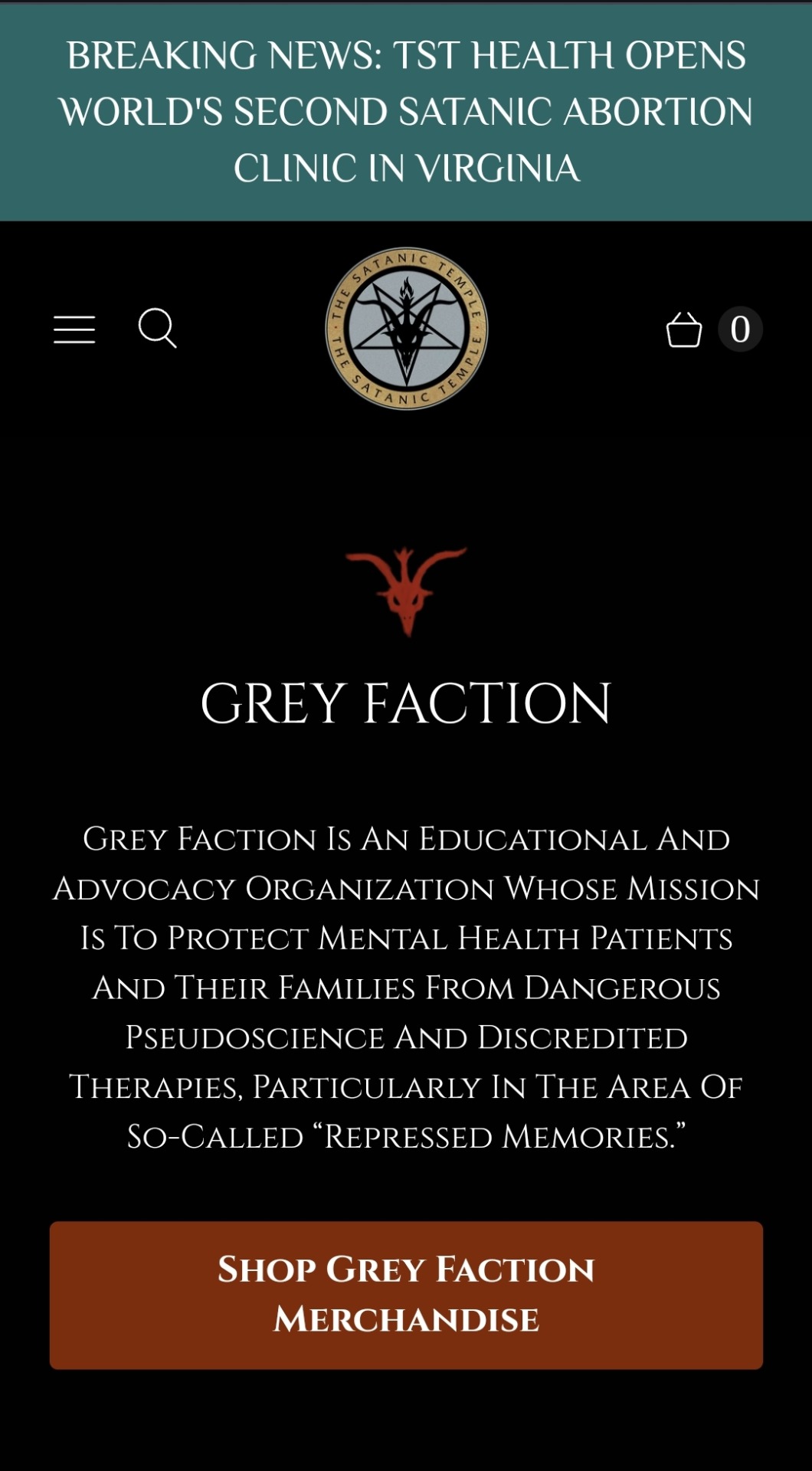
That just begs the question: What are repressed memories?
Not to worry! I, a very much not trained psychologist, psychotherapist or mental health professional of any kind will absolutely explain it to you. You should totally listen to me without question. Me not being done with the three year degree in psychological sciences and techniques is not going to stop me. Indubitably! (That is my attempt of a joke)
A repressed memory is an autobiographical memory (general facts about the world, oneself, and one's experiences) that for some reason cannot be recalled by the person. It is usually related to a traumatic or stressful event, and is based in Freudian thought and psychology. (Freud is the guy that did psychosexual development as a basis for his ideas on libido btw).
Are repressed memories actually a thing though?
The answer to that (as I understand it!!!!!!) is that it'd be hard to come to a consensus.
Why?
Because memory is weird! But one thing many can attest is the fact that trauma makes memories weird.
There are a number of problems that come with trying to prove that repressed memories are a thing, and I'm going to also sprinkle in my thoughts on those:
First of all, studying repression relies on retrospective reports, and unless you were liveblogging your traumatic experience, it's hard to know definitively if things happened. This of course ignores the role that brain regions such as the amygdala and hippocampus and their over and under-stimulation respectively affect memory storage in traumatic situations and even after as long-term effects (which is something that I'd say is pretty well known and not controversial?? But genuinely correct me if I'm wrong as this is not my area of interest), but we're going to ignore that ig.
Studies also do show that memory is unreliable. The fact that our bodies are controlled by a surprisingly stable slushy that somehow has the capability of independent (although subjective) experience I think makes that claim pretty believable. We're also going to ignore here the fact that many of those studies, to my knowledge, have only focused on non-traumatic memory creation by suggestion and peer pressure (Elizabeth Loftus I'm looking at you), and those that do focus on traumatic memories just show that there's degradation of memories. Nothing to my limited knowledge suggests that trauma survivors are more likely to develop false memories.
I think it's also important to note that because of the way traumatic memories are stored, a lot of those memories are going to lack coherence. I just realized I didn't explain what the amygdala and hippocampus have to do with memory, but basically the former is responsible for emotions and encoding them in memory (especially implicit/emotional memory), with its activation being connected to stronger and more vivid recall, and the latter is in charge of actually creating those memories by taking all sensory input from your senses and your emotions, hormones etc. and storing it, with stress hormones like probably cortisol contributing to a more fragmented and disjointed memory. Because of all of that, I think it's safe to say that it's not a stretch to say that the combination of emotional responses and hormonal responses while in a traumatic situation would lead to differences between normal everyday memories and trauma. As much as self-reports show that repressed memories are a thing, it is not empirical evidence afaik, especially because of their lack of coherence.
So what's the verdict?
I personally believe that Grey Faction has it all wrong. I don't think that with DID it's repression of memories at all.
But let me explain (I love yapping)
This is what they have to say to the DID community. (Hyperlink)
And I want to dissect this bit by bit.
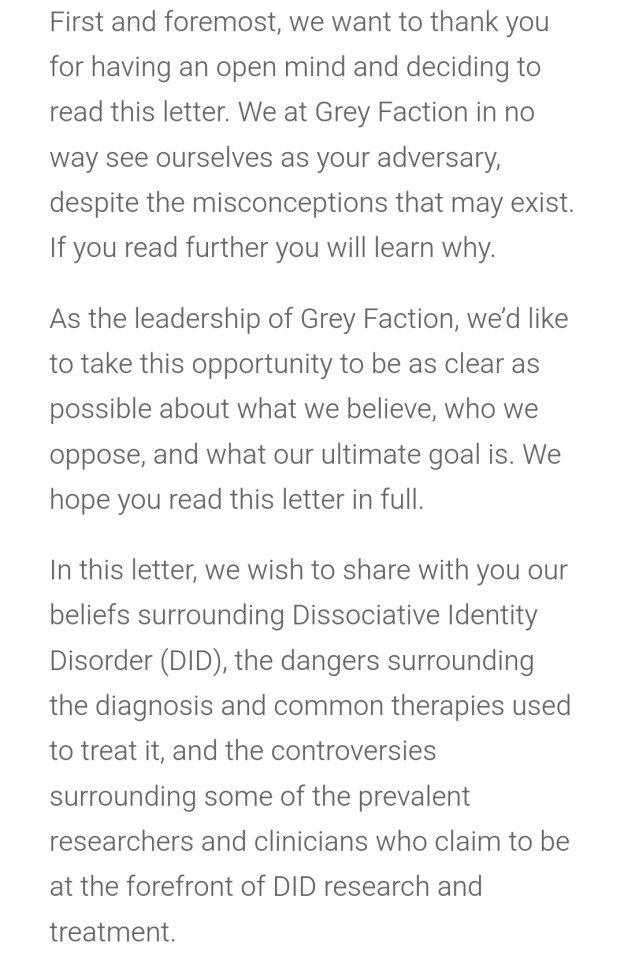
The first thing that strikes me as odd if the phrasing they use in the last paragraph. "the dangers surrounding the diagnosis"? What dangers? Social backlash stemming from the common misconceptions of "split personality" and the "evil alter" stereotype? That's not from the diagnosis.
Diagnosis is a lovely thing. If you are experiencing symptoms of something, being validated medically is wonderful, and can lead to finally finding a community (and feeling like you fit in it). However, on paper it's merely a way for the government to be able to say if you get benefits or not (disability aid, financial aid, free or at least discounted healthcare in some countries etc.). It's pretty well known that disabled people do experience massive amounts of discrimination from lots of institutions, but the benefits are there. This may not be an objective way to continue this part of the post, but my family gets some money and other benefits from the government exactly because of those benefits, and there haven't been any issues bureaucratically speaking. We don't pay university taxes, we don't pay for food or we get discounts, we have priority on certain procedures etc., and that is most definitely not the experience of every disabled person (especially people with more visible disabilities), but I still wouldn't call a diagnosis a "danger" since if you had those issues and no diagnosis you'd just have less legal protections.
The dangers of common therapies I feel like could only come from an incorrect usage of therapeutic techniques? If I were to do traditional EMDR on a chronically traumatized patient though I wouldn't complain if the patient just dissociated. As it's understood (by me and I'm hoping other people - I have to emphasize that I'm not a specialist of anything), complex trauma and C-PTSD deals with prolonged chronic traumatization instead of more "singular" traumas, and usually develops in childhood. Usually people with C-PTSD have issues with emotional management, dissociation, negative thoughts and relationships, and administering EMDR without taking those into consideration can lead to emotional flooding, dissociation and re-traumatization. That's a risk. Solution: go to a trauma-informed therapist that specializes in that therapy technique.
The controversies part is just weird to me. I really do not care if the researchers at the forefront of DID research are weird. I don't care that Onno van der Hart lost his license because I don't care about him as a person. I don't care that Dr. Colin A. Ross had something to do with shooting lasers out of his eyes? Idk where I heard that, but again, I'm here for their theories and research and not their life stories. I may mildly dislike some of them but that just means I won't book a session with them.
Anyways,
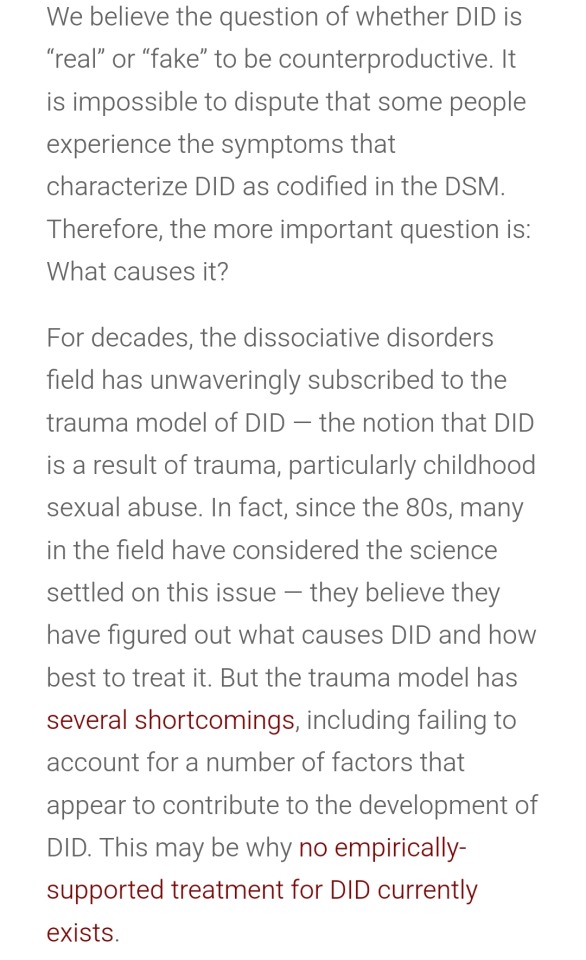
First paragraph is correct, but I do want fo emphasize that unless people are experiencing delusions of breaks in reality in general that for some reason lead them to believe that they are a system (which I'm assuming would manifest as a kind of thought insertion delusion, with features of somatic delusions given that systems usually switch), only a professional should be safely telling them why those symptoms are happening. If they start saying outlandish things about being a system as if it's a common experience you should absolutely correct them and explain that it's not common for most systems or whatever, but saying they don't know what they're experiencing is a weird statement. Human experience is subjective, so your argument falls flat immediately.
Anyways, they then say that the trauma model is undisputed (it is not? At least it doesn't seem like it with a lot of professionals believing that it's just fantasy and roleplay) even though there are shortcomings (which are pretty well known. Just read The Haunted Self and you'll see among other things why the strict categorization of psychological experiences does not work). I just feel like with the research we have and the overwhelming majority of DID patients having self-reported trauma, it's kind of a no-brainer to come to the conclusion that trauma is a cause for DID.
Think about it: if DID is a disorder which features dissociation as its main feature, and dissociation is usually seen as a reaction to trauma, why couldn't trauma be a cause for it?
I also don't find value in declaring a treatment technique to be "empirically-supported". They're simply tools used to treat and manage disorders. They might not work for everyone, but does it really matter that much to have a single treatment for all DID patients? Some might respond well to some treatments and some to others. Who cares.
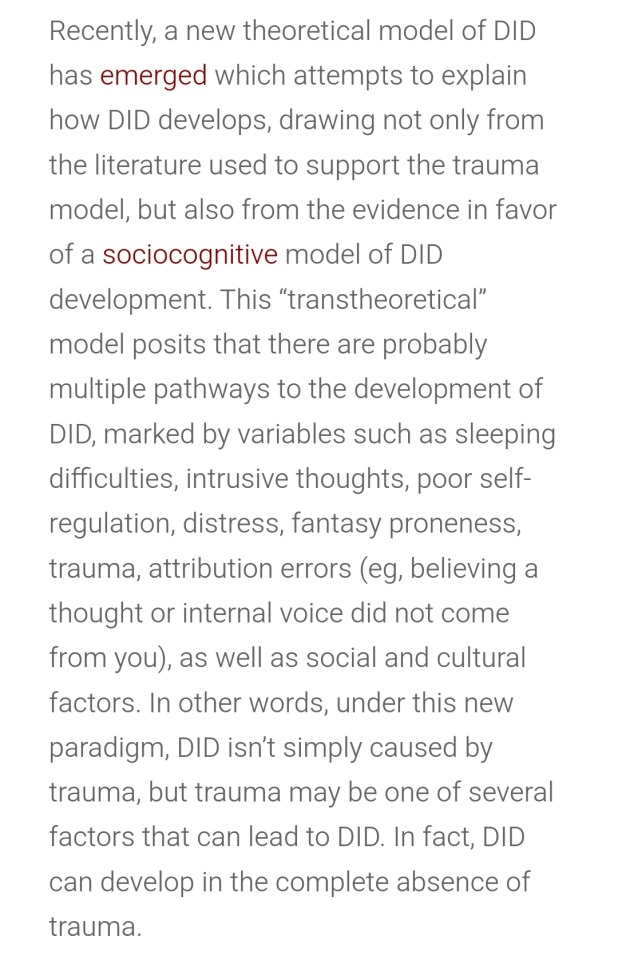
You see, I have a problem with both the trauma model (PTM) and sociocognitive model (SCM) of DID. It might not be explicit, but they both come off as staying that DID is caused only and exclusively by X, which is a major issue. If someone who presented with DID symptoms (amnesia, distress and all) came to your office (in thai scenario, you magically became a therapist) and they told you that their DID was not caused by trauma, while still having distressing experiences because of the DID, your first thought should never be to tell them that it's impossible and that they must have hidden trauma somewhere in their cranium. You know what you should do? Treat the paying customer 🥰 and generally making it so that in x amount of time they won't have to enter your office complaining of a part getting them fired and spending their severance check on rubber duckies. Could they be faking? Absolutely, but it's their loss mostly. They they really had something goin on and it's not DID you should be doing interviews, inventories, tests etc. and then tell them your verdict. Simple as that.
The SCM of DID is also to my knowledge less accurate when it comes go prevalence (Kate MA, Hopwood T, Jamieson G. The prevalence of Dissociative Disorders and dissociative experiences in college populations: a meta-analysis of 98 studies. J Trauma Dissociation. 2020 Jan-Feb;21(1):16-61. doi: 10.1080/15299732.2019.1647915). I think that should be noted.
Anyways, their transtheoretical framework seems to not be discrediting any of those models, but instead integrating them to explain all experiences of disordered dissociation. I think that's good. It obviously takes from the PTM as it's undeniable that dissociative disorders can be post-traumatic, and from the SCM as features like introjection and fantasy do absolutely take a part in how lots of systems function. From what I read, it's not a bad thing. With my own experiences being that of non-trauma based polypsychism I can 100% believe that for example treating an internal voice as not your own can lead to experiences of multiple selves. I would know, I'm that voice (plot twist!!)
Whether DID can develop in the complete absence of trauma is debatable, however. Not impossible mind you, simply because there is currently no way to test it.
You cannot prove that DID is always caused by trauma. You also cannot prove that DID is not caused by trauma. Both of those statements are generalizations that cannot be valid because dissociation itself is not proven to come from anything. It's a mechanism. An experience. Of course, trauma is very very much linked to higher degreed of dissociation, but saying something is always or never cause by something is a very bold claim.
You can't even prove that DID is mostly caused by Trauma. What if there was a massive rural population somewhere in the world that all had symptoms of DID that were demonstrably not caused by trauma? Of what if every single person with symptoms of DID does in fact have trauma? We can't know.
I'm tired, I'll continue this tomorrow if I remember. Toodles! Syscourse is fine on this post btw, but I can't stop you either way so‼️
3 notes
·
View notes
Text
Stress systems
There are many things happening during stress, and it all starts with my beloved nemesis, the hypothalamus. It senses a stressor and gets to work by switching on other parts.
Sympathetic nervous system
It goes right to adrenal gland (right above your kidneys). The secretory cells there are actually a part of the nervous system, but that's a secret, don't tell anyone.
Either way, it produces adrenaline and noradrenaline (see how it makes sense paired together with the name "adrenal gland". however, if you are american then they produce epinephrine and norepinephrine).
This causes visceral stress reactions:
increased heart rate and strength
vasoconstriction (smaller diameter of blood vessels) in inner organs (mainly digestive) and skin (to not waste precious blood on them)
vasodilation (opposite of the prev point) in heart, lungs, brain and skeletal muscle (because those are the bad guys you need for fighting or running away)
glycogenolysis in the liver (where you would normally have glucose stored as glycogen just in case, and this is the case)
sweating (let the toxins out babey), hindering digestive processes (not relevant at the moment)
Anterior pituitary
This bad boy is up there with my beloved nemesis, and it is there to activate a bunch of hormonal systems.
Adrenocorticotropic hormone (or, ACTH. Abbreviations are there to make life easier for real). This guy will go to adrenal gland, but to a different par of it! In turn, we will get:
aldosterone - to keep inside sodium (and due to all known laws of chemistry and physics, water with it. so, basically, no pee in bladder!), but! at the same time it stimulates hydrogen ion excretion (to not make it awfully acidic in the organism)
glucocorticoids (most popular babe being cortisol) - to promote gluconeogenesis (a bit different process of what I described earlier. this has nothing to do with storage. this has everything to do with the Krebs cycle. long story short, more glucose! in circulation!). They also promote protein catablosim (it literally breaks down stuff in order to get energy. it would be like chopping up your bed for fire to keep the war forces running or smth. this was a bad metaphor but you got me). And! Finally - hindering inflammatory reactions. To keep one alert etc. (But beware! if the stress is prolonged it means that your body cannot deal with pathogens)
Somatotropin, also known as growth hormone, also takes part in stress reaction. It's target is liver, where somatomedins are produced, which, in turn, increase fat catabolism. You see I think we've finally reached the breaking down of all the main substrates with this. Energy: available!
Finally, we've come to thyroid-stimulating hormone, which does what the name says. In turn, it produces thyroid hormones, which increase the breaking down of carbohydrates to get even more energy
Conclusion: awfully lot of systems that work together to make energy available.
4 notes
·
View notes
Text
Sound Healing Therapy
Sound Healing Therapy is a therapeutic practice that uses specific sound frequencies, vibrations, and tones to promote physical, emotional, and spiritual healing. By harnessing the power of sound, this therapy aims to restore balance in the body and mind, reduce stress, alleviate pain, and improve overall well-being. Sound healing can involve various tools such as singing bowls, tuning forks, gongs, and even the human voice, each designed to target specific areas of the body’s energy system for deep relaxation and rejuvenation.

Sound Healing Therapy: A Pathway to Physical and Emotional Wellness
In recent years, Sound Healing Therapy has emerged as a powerful tool for achieving overall wellness, combining ancient wisdom with modern science. This therapeutic practice uses specific sound frequencies and vibrations to promote healing, restore balance, and support emotional well-being. The impact of sound on the body, mind, and spirit has long been recognized, and today, sound therapy techniques are used to address a variety of health concerns, from stress relief to pain management.
In this blog, we’ll explore the concept of sound healing therapy, its benefits, and how different sound frequencies and vibrational techniques can contribute to your well-being.
What is Sound Healing Therapy?
Sound Healing Therapy involves using sound frequencies, vibrations, and tones to support the body's natural healing processes. The practice relies on the concept that everything in the universe, including the human body, is made up of energy that vibrates at certain frequencies. When these vibrations are out of sync—due to illness, emotional distress, or environmental factors—sound healing therapy can help restore harmony.
The therapy is typically performed using instruments like singing bowls, gongs, tuning forks, chimes, and the human voice. Each of these tools produces specific frequencies that can promote physical, emotional, and spiritual healing. Through these vibrations, sound healing aims to stimulate energy flow, release blockages, and encourage deep relaxation.
The Benefits of Sound Therapy
Sound healing therapy offers a range of benefits that can positively impact various aspects of your health. Here are some of the key benefits:
1. Stress Reduction and Relaxation
One of the most well-known benefits of sound therapy is its ability to reduce stress and induce relaxation. The therapeutic sounds and vibrations help activate the parasympathetic nervous system, which promotes relaxation and lowers cortisol (the stress hormone). This leads to a calmer mind, reduced anxiety, and an overall sense of peace.
2. Emotional Healing
Sound healing therapy is also a powerful tool for emotional well-being. It can help release negative emotions such as fear, guilt, and anger, making space for positive emotions like love, joy, and gratitude. Many people use sound therapy to heal emotional trauma, alleviate depression, and address anxiety.
3. Pain Management
Another significant benefit of sound therapy is its ability to manage pain. Vibrational healing therapy works by sending sound vibrations into the body, which helps release muscle tension and improve blood flow. This can result in the relief of chronic pain, headaches, and even symptoms of conditions like arthritis.
4. Improved Sleep
Sound healing therapy can help improve sleep by calming the mind and releasing physical tension. The soothing sounds can promote deeper, more restorative sleep and help reset the body’s natural circadian rhythms.
5. Enhanced Focus and Clarity
Sound therapy can enhance mental clarity and focus. By stimulating the brain with specific frequencies, it can improve concentration, cognitive function, and memory. This makes sound therapy a valuable tool for those looking to boost productivity or deepen their meditation practice.
The Role of Sound Frequency Therapy
Sound Frequency Therapy is at the core of sound healing. It involves using specific frequencies to stimulate healing within the body and mind. Each frequency has its own unique effect, and when combined with other sound therapy techniques, it can target specific areas of the body or emotional states.
Here are some common frequencies used in sound frequency therapy:
432 Hz: Known as the “universal frequency,” it is believed to promote feelings of peace and well-being. It is said to resonate with the natural frequency of the Earth and the human body, making it ideal for relaxation and healing.
528 Hz: Often referred to as the “love frequency,” this sound is associated with DNA repair and healing at a cellular level. It is commonly used to promote emotional healing, creativity, and harmony.
396 Hz: This frequency is associated with releasing fear and guilt, helping to clear emotional blockages and promote inner peace.
639 Hz: This frequency is often used to improve communication, relationships, and emotional healing, particularly in the context of forgiveness and connection.
Vibrational Healing Therapy: How Sound Affects the Body
Vibrational Healing Therapy is a subcategory of sound healing that focuses on how sound vibrations influence the body’s energy systems. The body is made of energy, and when energy becomes stagnant or blocked, it can lead to physical or emotional discomfort. Vibrational healing therapy aims to release these blockages and restore balance by using sound vibrations that penetrate deep into the body’s energy fields.
In vibrational healing therapy, tools such as crystal singing bowls, tuning forks, and gong baths are used to produce powerful vibrations that interact with the body’s cells. These vibrations stimulate energy flow, promote healing, and help release emotional or physical tension.
Healing with Sound Therapy: Techniques and Tools
There are various techniques and tools used in sound healing therapy to facilitate healing and well-being. Here are some of the most popular sound therapy techniques:
1. Sound Baths
A sound bath is an immersive experience where participants lie down and listen to a variety of sound instruments such as singing bowls, gongs, and chimes. The sounds and vibrations create a deep sense of relaxation, helping to clear the mind and release stress. Sound baths are an excellent way to experience the therapeutic effects of sound healing in a group setting.
2. Binaural Beats
Binaural beats involve playing two different sound frequencies in each ear. The brain perceives a third frequency that is the difference between the two. This technique can help with relaxation, focus, and sleep by synchronizing brainwave activity with specific frequencies. Binaural beats are often used in meditation and mindfulness practices.
3. Tuning Fork Therapy
Tuning fork therapy involves using metal tuning forks that are struck to create specific frequencies. These forks are then applied to certain points on the body, such as acupressure points or chakras, to stimulate energy flow and restore balance. This technique is ideal for those seeking to relieve pain or address energetic imbalances.
4. Crystal Singing Bowls
Crystal singing bowls are made from quartz and are used to produce harmonic sounds that resonate with the body’s energy centers. These bowls are often played during meditation or sound baths to promote emotional healing, balance, and relaxation.
5. Vocal Toning and Chanting
Vocal toning and chanting are powerful sound therapy techniques that use the human voice to create healing vibrations. By chanting specific mantras or vocalizing certain sounds, individuals can release emotional tension and promote healing in the body. This technique is commonly used in spiritual practices and meditation.
Conclusion
Sound Healing Therapy is a transformative practice that has been used for centuries to promote physical, mental, and emotional healing. By harnessing the power of sound frequencies and vibrations, sound therapy offers a non-invasive, holistic approach to wellness. Whether through sound baths, vibrational healing therapy, or sound frequency techniques, this therapeutic modality provides a pathway to healing and balance for those seeking to improve their well-being.
As research continues to explore the science behind sound healing, its benefits are becoming increasingly recognized. If you're looking to reduce stress, alleviate pain, or enhance emotional and spiritual health, sound healing therapy might be the perfect tool to help you on your journey.
#Benefits of sound therapy#Sound Healing Therapy#Vibrational healing therapy#Healing with sound therapy#Sound therapy techniques
2 notes
·
View notes
Text
The ABCs of Hormones
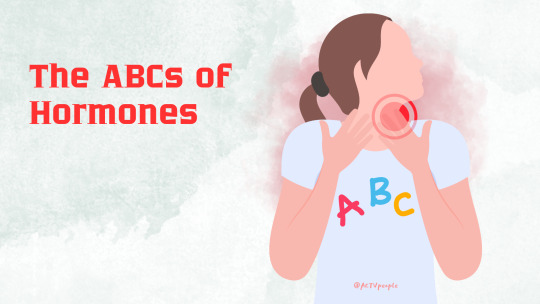
How They Affect Our Mood and Health
Hey friends! Today, let's dive into something that often stays behind the scenes but affects us every single day. Yep, I'm talking about hormones! These tiny chemical substances act as invisible conductors, regulating our mood and emotional state. Let's explore the world of hormones letter by letter, to see which hormones are responsible for our happiness, stress, motivation, and even sluggishness—and most importantly, how to keep them balanced so that life is brighter and more fulfilling.
Hormones That Control Our Mood
A — Adrenaline Adrenaline is the "fight or flight" hormone. It kicks in during stressful situations, giving us the energy to react quickly. This hormone helps us deal with critical moments, improving physical endurance and focus. But be careful—too much adrenaline over time can lead to anxiety.
V — Vasopressin Vasopressin regulates water balance in our body and affects blood pressure. If this hormone drops, we may feel tired and less focused. Maintaining good hydration is important for overall well-being.
G — Ghrelin Ghrelin is known as the "hunger hormone." It signals your brain when it's time to eat. When you're feeling intense hunger, you can thank ghrelin for that. To keep it in check, eat regularly and avoid long gaps between meals.
D — Dopamine Dopamine is the "pleasure hormone." It’s responsible for motivation and rewards. Whenever you feel incredibly inspired or like you can conquer the world, it's probably thanks to dopamine. To keep dopamine levels up, try new hobbies, exercise, and celebrate even the smallest victories. Even watching motivational videos can give your brain a dopamine boost.
E — Estrogen Estrogen is the primary female hormone that regulates the menstrual cycle and affects mood. Fluctuations in estrogen levels can cause mood swings, especially during the premenstrual period. Healthy eating and physical activity help stabilize these fluctuations and maintain balance.
M — Maturity (Testosterone) Testosterone is the "hormone of maturity," especially important for men. It’s responsible for libido, muscle mass, and confidence. Testosterone levels also affect energy and motivation. Exercise and a proper diet help maintain it at a healthy level.
I — Insulin Insulin is the hormone that regulates blood sugar levels. It allows glucose to enter cells and be used for energy. Balancing insulin is key for maintaining stable energy levels and preventing diabetes. Avoiding sugary foods and fast food is a good way to keep insulin levels in check.
C — Cortisol Cortisol is the "stress hormone." It helps the body cope with critical situations, but chronic stress keeps cortisol levels high, leading to fatigue and depression. Meditation, rest, and physical activity are good ways to manage cortisol.
M — Melatonin Melatonin is the sleep hormone, helping us fall asleep and regulating our internal clock. Its level rises in the dark, promoting a restful sleep. To maintain melatonin levels, avoid bright light in the evening and try to go to bed at the same time every night.
O — Oxytocin Oxytocin is the "love and bonding hormone." It’s released when we hug, show affection, or spend time with loved ones. High oxytocin levels help us feel happier and more connected. Hug your loved ones and express affection—it’s a simple and effective way to boost this hormone.
S — Serotonin Serotonin is the "happiness hormone." It regulates mood, sleep, and appetite. Low serotonin levels are often associated with depression and anxiety. To increase serotonin, eat foods rich in tryptophan like bananas, nuts, and dark chocolate, and spend more time in the sunlight.
T — Thyroxine Thyroxine is a thyroid hormone that regulates metabolism. Its imbalance can lead to weight issues and energy problems. Eating enough iodine (like seaweed) and maintaining a healthy lifestyle support normal thyroxine levels.
P — Phenylethylamine Phenylethylamine is often called the "love hormone." It’s released when we feel romantic attraction and helps boost dopamine, adding those wonderful feelings of love and excitement.
Conclusion
That's our ABCs of hormones! It seems like so many little conductors are controlling our mood and health that it can make your head spin. But don't worry! In the next article, we'll talk about what influences hormonal balance and how to keep it in check, so your hormones can be your best friends. Give us a like and stay tuned!
#hormones#hrt estrogen#serotonin#Oxytocin#adrenaline#cortisol#melatonin#insulin#testosterone#dopamine#health and wellness
3 notes
·
View notes
Text
10 Ways to Boost Your Immune System Naturally.
The "immune system" includes all cells, tissues, and organs that act together against pathogen infections. With no lifestyle change guaranteeing immunity, such routines will ramp up the sun's magnificence upon seated viewers. Here are ten tips using natural remedies to elevate your immune system to a better climactic state than it normally would be.
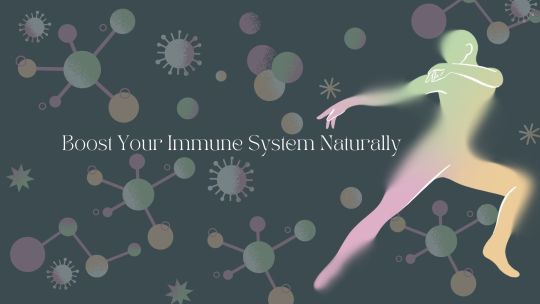
1. A Healthy Diet:
Eating a diseased food is carotenoid nonsense; what you eat is primarily a matter of health. The quality of any nuts is really going to be enough highly nutritious, for example:
Vitamin C: By helping in white blood cell production that fights infections, orange, lemon, strawberries, and other citrus fruits have been shown to boost immune responses.
Zink: Found on nuts, seeds, shellfish and legumes, zinc appears to help multiply immune cells. I, being an antioxidant, just protect cells from damage coming from free radicals.
Antioxidants: Several studies stated that foods such as blueberries, spinach, and green tea decrease inflammation and offer protection to immune cells from damage.
Healthy Fats: Fish like salmon, mackerel, herring, etc. provide omega-3 fats to reduce inflammation and plan a plan of action for the immune response.
Unique Tricks: Green vegetables, berries, nuts, and seeds cut across the work with great variability of provided nutrients.
2. Keep Hydrated:
Hydration is key to optimal functioning of the immune system. Water provides a medium for producing lymph, which distributes white blood cells and other immune cells throughout the body. It also cushions and buffers the body against various pathogens and flushes toxins out of your body while keeping skin healthy, which happens to be a physical barrier against infection.
Ways to Remain Hydrated:
Consume 8 glasses of water per day.
Eat lots of hydrating foods, such as watermelons, cucumbers, and oranges.
Cut down on sugary beverages and alcoholic drinks, as they would just lead to dehydration.
Unique Tricks: Carry your water bottle with you all day long to remind you to keep drinking water.
3. Get Enough Sleep:
Your body does much repair work while you sleep. It generates proteins called cytokines, which design medicine for the target of infection and inflammation. Sleep deprivation diminishes the synthesis of these proteins and weakens your immune defence.
Sleep tips:
7-9 hours of sleep must be achieved per night.
Be consistent with your sleeping hours even on weekends.
End your day with a peaceful bedtime routine (reading, meditation, or a warm bath) to enhance sleep quality.
Unique Tricks: Avoid using electronic devices right before going to bed. The blue light emanating from the phones and computers disrupts our production of melatonin and makes it more difficult to fall asleep.
4. Exercise Regularly:
Moderate and consistent exercise reduces inflammation and enables healthy circulation, thereby enhancing immune response through faster distribution of immune cells in different parts of your body. Studies have shown that compared with less active people, people who exercise have better immune responses.
Best exercises known to improve immunity abilities:
Moderate aerobic exercises include a brisk walk, sailing, swimming, or jogging.
Join a strength training program to promote muscle development and overall body function.
Join yoga and stretching exercises to relieve yourself from stress and widen your flexibility spectrum.
Unique Tricks: Strive for at least 150 minutes of moderate exercise every week. A brisk walk of 20-minute every day can go a long way toward improving the health of your immune system.
5. Stress Control:
Stress results in the production of the hormone called cortisol. This is a secretory hormone that suppresses the T-cell response, hence lowering an immunological response. Control of stress, therefore, achieves much towards ensuring optimal functioning of the immune system.
Maintain Stress Control:
Meditation and deep breathing: There is some mindfulness and breathing exercise there that would make your nervous system even calmer and reduce the production of cortisol.
Journaling: You can write down your thoughts and feelings as a powerful stress-reducer.
Time management: Schedule your day so that you are not overwhelmed by it and allow time for things that make you happy.
Unique Tricks: Begin with 5-10 min meditation or mindfulness breathing and add more minutes.
6. Probiotics for Healthy Guts:
Gut Health is the basis of your comprehensive health and wellbeing. Without this, you can't keep the gut flora in good health.
Probiotic Foods:
Yogurt with live cultures.
Fermented milk drink: Kefir.
Sauerkraut and kimchi.
If you can't stomach any of the food on the list, then a good probiotic supplement is the next best thing for your gut.
Unique Tricks: When buying yoghurt or other fermentated foodstuffs, be sure to check for the "live and active cultures" on the label to be sure that you are getting live probiotics.
7. Use Herbs and Spices:
Herbs and spices are used not only for flavour but can deeply strengthen immunity. Scientific research is providing so much more evidence of natural ingredients in battling inflammation and fighting off infections.
Immune-Boosting Herbs and Spices:
Ginger: This has an anti-inflammatory and antiviral factor.
Turmeric: Curcumin contains one of the more potent natural anti-inflammatory agents.Garlic: Rich in immune stimulating and antiviral properties.Echinacea: Most people use it preventatively to ward off colds and to reduce the symptoms.Elderberry: It contains antioxidants and may help deal with viral infections.
Unique Tricks: Add fresh herbs and spices into your soups, teas and foods for added healthy benefits.
8. Get enough sun-light Vitamin D:
Vitamin D is a critical immune system nutrient. It stimulates the action of monocytes and macrophages, the critical white blood cells that form an integral part of the immune response. Unfortunately, most of us have inadequate amounts of Vitamin D, and this deficiency is at its worst during the winter.
Get enough Vitamin D: Spend at least 10-30 minutes outside in the sun several times a week, depending on your skin type and your location.
Rich sources of Vitamin D: Fatty fish (salmon, tuna), egg yolks, and fortified foods (milk, cereal). You may also take a Vitamin D supplement, especially during the winter or if you usually stay indoors most of the time.
Unique Tricks: Ask for a blood test to know your level of Vitamin D. It's a good check-up for you in case you do not get enough of this vitamin.
9. Be Hygiene:
Hygiene will determine the best way that an illness can be avoided. Hygiene in hand washing is likely to represent the most practical form of preventing germs and even infection.
Practicing Hygiene:
Wash your hands frequently with soap and water, especially immediately after visiting public or by touching shared facilities.
Use hand sanitiser containing at least 60% alcohol content if you can't get soap as well as water.
Don't touch your face particularly eyes, nose and mouth.
Unique Tricks: Carry hand sanitiser with you whenever you go or develop the habit of sanitising places you need to rub against repeatedly, like your phone, keyboard, or door handles.
10. Avoid Smoking and Drinking Alcohol:
Smoking would further devastate the immunity and enhance the damage to the lungs. Alcohol misuse would also lose or reduce the immune system, as not all the cells of the immune system work correctly. Precautions to be Taken to Reduce the Risk:
Quit smoking, or seek medical advice for help quitting smoking.
Alcohol should only be consumed at a limit stated above: One drink per day for women and two for men.
Unique Tricks: While an alcohol detox substitute drinks with hydrating alternatives such as herbal teas or infused water.
Conclusion: All-natural approaches towards boosting immunity do not include extreme measures. That includes nutrient-rich food, hydration, managing stress, and healthy lifestyles. You would soon feel a change within yourself once you began adopting these hints in your daily life.
2 notes
·
View notes
Text
Top 10 Natural Supplements to Boost Women’s Sexual Health

Maintaining a healthy sex drive and overall sexual wellness is an important part of life, and many women are looking for natural ways to support this aspect of their well-being. Natural supplements can play a key role in enhancing sexual health, balancing hormones, and boosting energy levels. In this article, we’ll explore the top 10 supplements that are recommended for women’s sexual health, highlighting their benefits and how they work.
1. Maca Root
Maca Root is a plant native to Peru that has been used for centuries to enhance libido and energy. It’s a great option for balancing hormones, increasing sexual desire, and even boosting fertility in both men and women.
Available in powder or capsule form, Maca is easy to incorporate into your routine, whether you add it to smoothies or take it as a supplement. Many women report a noticeable improvement in sexual function and overall energy after using Maca.
2. Ashwagandha
Ashwagandha is an adaptogenic herb that is well-known for its ability to reduce stress and anxiety—two major factors that can contribute to a lower sex drive. By helping the body manage stress and reduce cortisol levels, Ashwagandha can enhance your mood and sexual vitality.
This calming herb not only supports mental health but can also improve your overall sexual well-being by making you feel more relaxed and connected during intimate moments.
3. Tribulus Terrestris
Tribulus Terrestris is a herbal supplement that is often used to boost libido and enhance sexual satisfaction. It works by increasing androgen levels, which are important hormones that influence sexual desire and performance.
Studies have shown that Tribulus can be particularly effective for women who experience a decrease in sexual satisfaction or desire, making it a powerful addition to your natural wellness routine.
4. Ginseng
Ginseng is another adaptogenic herb that’s known for improving energy levels and stamina, which are essential for sexual performance. It also enhances blood circulation, which can increase sensitivity and arousal.
If you’re looking for a natural way to increase both sexual desire and overall physical energy, Ginseng is a great option to consider.
5. Fenugreek
Fenugreek is a well-known herb for balancing hormones and improving sexual health. It contains compounds that help raise estrogen levels and promote libido.
Research has shown that women who take Fenugreek report improved sexual arousal and satisfaction, making it one of the most effective natural supplements for enhancing sexual health.
6. L-Arginine
L-Arginine is an amino acid that plays a key role in increasing nitric oxide production, which improves blood flow throughout the body. For sexual health, better circulation means improved arousal and responsiveness, which can enhance sensitivity in intimate areas.
L-Arginine is available in supplement form and can be particularly helpful for women who are looking to improve their overall sexual experience.
7. Omega-3 Fatty Acids
Omega-3 fatty acids, found in fish oil or flaxseed oil, help regulate hormones and improve circulation. They also reduce inflammation and boost mood, all of which contribute to better sexual health and higher libido.
By supporting overall heart and brain health, Omega-3s can also improve your energy and stamina, which are key for a healthy sex life.
8. Shatavari
Shatavari is an Ayurvedic herb that has long been used to support female reproductive health. It’s known for its ability to balance hormones and increase libido, particularly in women who are going through menopause or experiencing hormonal imbalances.
Shatavari is often recommended for women who are looking for natural ways to enhance their sexual health during times of hormonal change.
9. Vitamin D
Vitamin D is essential for overall health, and it also plays an important role in sexual health. It helps regulate hormones and has been linked to improved libido and greater sexual satisfaction in women.
If you’re not getting enough sun, taking a Vitamin D supplement can help ensure that your hormone levels stay balanced, supporting both your mood and your sexual vitality.
10. Zinc
Zinc is a mineral that’s essential for the production of sex hormones like estrogen and testosterone. It’s also known to improve libido and sexual function by supporting hormonal health.
Zinc is a great addition to any wellness routine, as it helps maintain healthy hormone levels, boosts immunity, and promotes sexual well-being.
Conclusion
These natural supplements can help support women’s sexual health by balancing hormones, boosting libido, and improving energy levels. Whether you’re looking to enhance intimacy or simply want to feel more vibrant and connected, these supplements offer a natural way to improve your sexual well-being.
However, it’s important to consult with a healthcare professional before starting any new supplements, especially if you have any underlying health conditions or are taking medications.
Looking for high-quality supplements to support your sexual health and overall wellness? Shop premium nutrition at Dapear.com! From multivitamins to collagen, Dapear offers a wide range of supplements to help you feel your best naturally.
By incorporating these supplements into your daily routine, you can experience the benefits of natural support for your sexual health while also boosting your overall wellness.
#WomensHealth#SexualWellness#NaturalSupplements#LibidoBoost#HormoneBalance#HealthyLiving#MacaRoot#Ashwagandha#GinsengBenefits#Fenugreek#Omega3#WellnessJourney#Dapear#SelfCare#WomensVitality#NaturalHealing
2 notes
·
View notes
Text
Health update
My skin is getting better with time. I know the inflammation on my face is caused by allergies. My general eczema is caused by hormones.
My allergies and face will get better and at least my face isn't flaring as much as before.
My hands are getting better as well. The antibiotics are helping. Also I know high cortisol does also contribute to my skin inflammation because it gets worse with stress, in the morning, and when I did IF (which is known to raise cortisol in women). My obgyn is helping me with estrogen balance, but I know cortisol management can help. Managing all my hormones can help.
My cramps have gotten painful recently and that could be due to hormonal imbalances and even stress.
I get good sleep and am cycling my fasting and am eating an anti-inflammatory diet. Also coffee is known to raise cortisol, so I'm switching to matcha now. So far I feel better and my hands aren't as itchy.
Also from a more cosmetic POV, matcha makes my skin healthy, pink, and glowing and coffee dries it out. I used to drink matcha all the time in Fall 2019 and my skin looked great (I had bad eczema and ragweed allergies at the time, but my face looked refreshed). But now I've learned to care for health more than looks.
Stress relief and anxiety management are other things I need to work, but they will take time. I'm in an anxious state and need psychological support around me.
Things will get better for me. For now:
anti-inflammatory/low glycemic diet
don't eat a lot of sugar
intermittent fasting
good sleep
nasal breathing
drinking 2 L of reverse osmosis daily
reducing cortisol
brisk walking
taking my supplements to fill in nutritional gaps
eat gut supporting foods and supplements (ION humic extract, fiber and probiotic rich)/take digestive enzymes to reduce bloating
switching to matcha from coffee
supporting hormones balance especially in the context of female hormones and insulin + cycle synching
look into stress relief, meditation and mindfulness.
basic hygiene like showering, skin care routine, and brushing teeth
trying yoga and pilates for cortisol reduction and relieving tight muscles and posture support
go for routine health exams
ensure you are metabolically healthy and at a healthy weight
getting psychological support I need (I need a lot)
establishing healthy connections with others
establishing self confidence
wearing spf
Doing brain challenging activities like puzzles
I've tried switching to "natural" products, but it can be challenging. Plus aluminum free deodorant really irritated my skin and I don't want to deal with more rashes. In general I do want to use stuff that contain less BPA plastics and heavy metals, but I do want to be realistic. My DIM supplement has ingredients that are important for phase 2 liver detox. So that is helpful for sure. I also try to eat organic foods that are on the dirty dozen, but I don't want overwhelm myself with that either. Same with 100% glass. I think what really helps is support liver health and even the reverse osmosis water. Having some plastic and harmful metals in the body isn't going to be detrimental to our health unless it's in high amounts.
Food is all about balance and I want to eat anti-inflammatory and low glycemic 80% of the time. I had chocolate today and mozzarella sticks yesterday. In college I did a lot of calorie restriction and sugar free dieting. I won't do that anymore, even though I understand the important of not overeating and not eating a lot of sugar. But restriction isn't healthy either. I think cycle fasting and eating mostly anti-inflammatory and low glycemic and not eating a lot of sugar helps. Also staying at a healthy weight and doing a lot of walking is great for blood sugar (at least in my case).
Anti-inflammatory diets reduce cortisol.
I have a lot of childhood trauma which I hid in the back of my head for over a decade. And a lot of it now is resurfacing and I need to address it. A lot of that resulted in trauma purging, where I start crying, getting angry and pessimistic and even lashing out. And I hate doing that, but what's even worse is running away from my trauma or else it's going to keep on following me. I healed from a lot of stuff, but I still need to heal from more things. And as a chronically anxious adult who was just diagnosed with autism, I need to receive a lot of psychological support as well. But overall I feel like I'm getting better.
I am also lonely and am scared of relationships and commitment because I am scared of pain and rejection. I also cannot accept other people's weaknesses and vulnerabilities because I cannot accept my own. I need to heal and support myself psychologically before moving onto a serious relationship. This is an area of my life where I feel like I'm falling behind, but I know it will get better.
2 notes
·
View notes